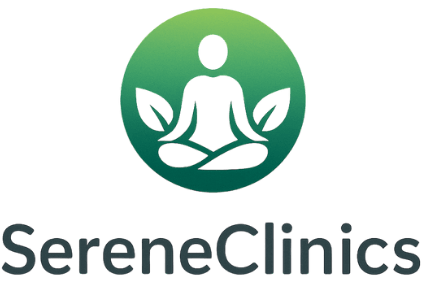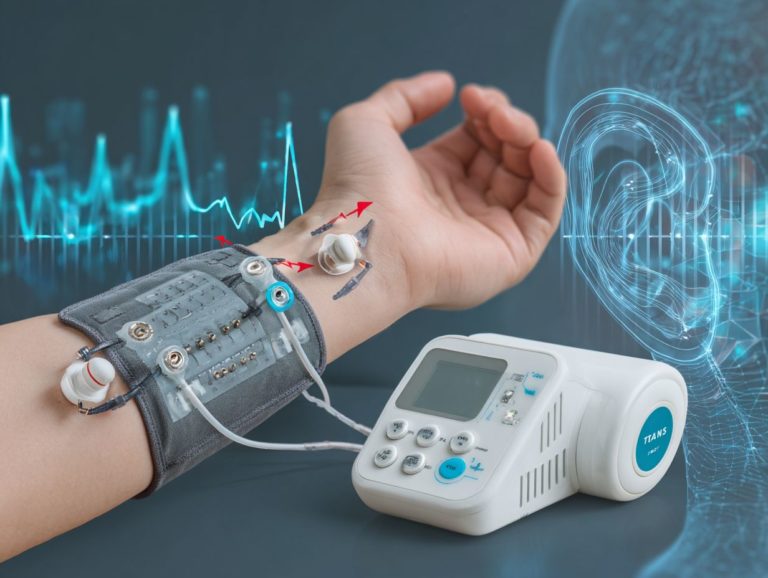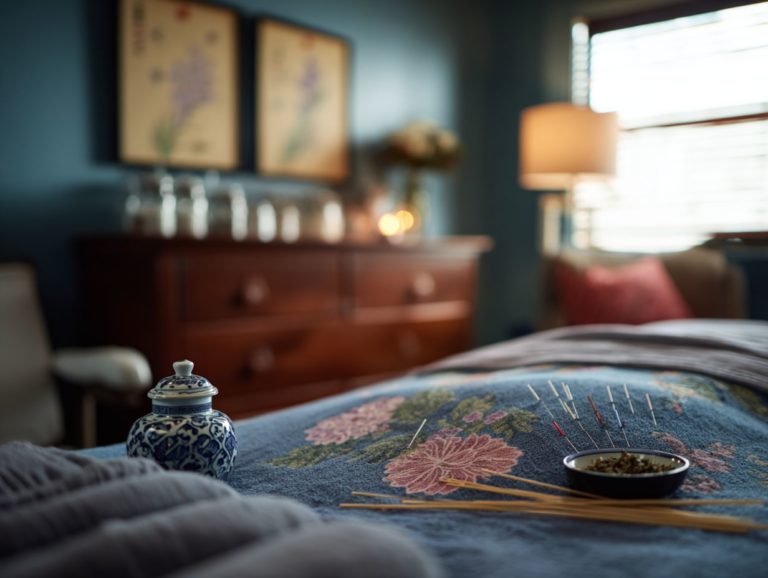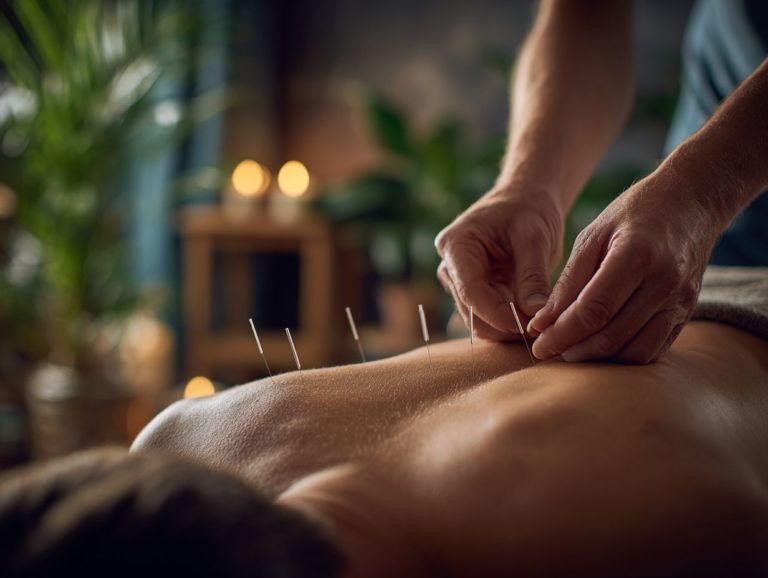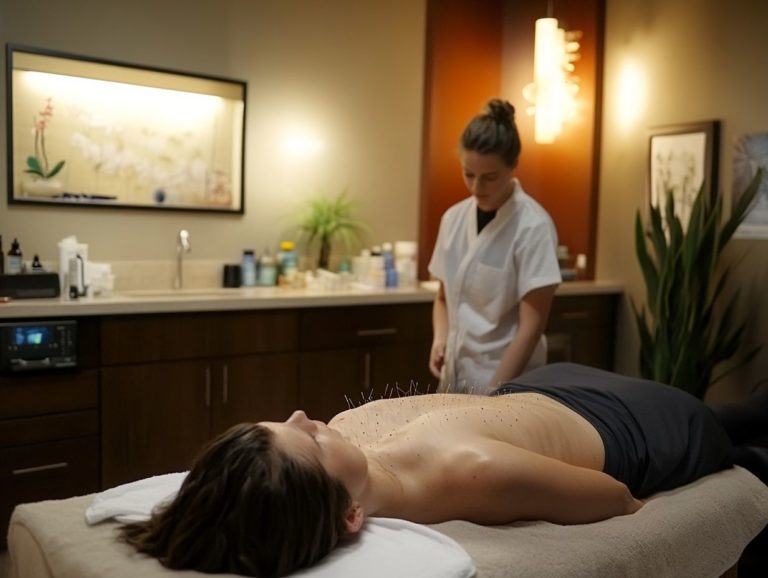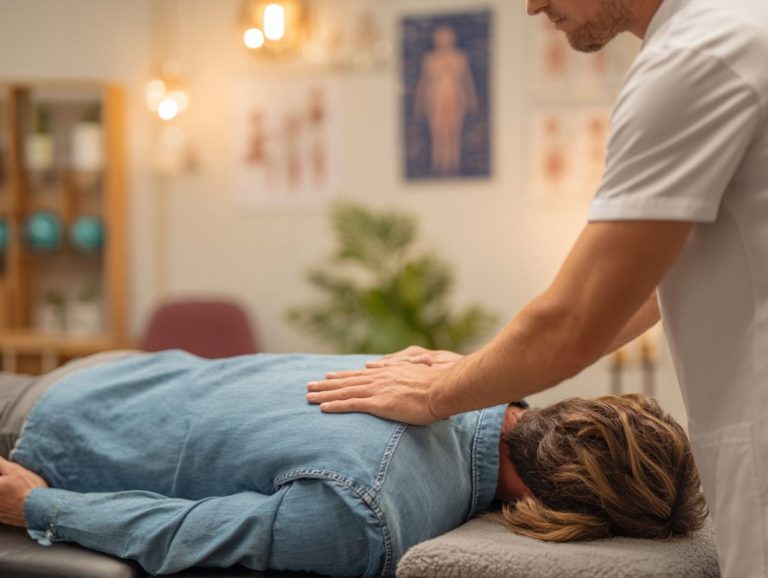Ear Acupuncture: Benefits and Techniques
Ear acupuncture, an ancient practice rooted in Traditional Chinese Medicine, offers a unique approach to healing by stimulating specific points on the ear.
This therapy helps reduce pain and deals with other problems like stress, insomnia, and addiction recovery.
We look into how ear acupuncture functions, its benefits, the techniques employed, and the common conditions it can treat.
Whether you’re curious about its safety Whether you are looking for an experienced expert, you’ll find details to understand this method.
Key Takeaways:
Contents
- 1 What is Ear Acupuncture?
- 2 How Does Ear Acupuncture Work?
- 3 What Are the Benefits of Ear Acupuncture?
- 4 Ear Acupuncture Research Data
- 5 What Are the Techniques Used in Ear Acupuncture?
- 6 What Are the Common Conditions Treated with Ear Acupuncture?
- 7 Is Ear Acupuncture Safe?
- 8 How Do I Find a Qualified Ear Acupuncture Practitioner?
- 9 What Can I Expect During an Ear Acupuncture Session?
- 10 How Often Should I Receive Ear Acupuncture Treatment?
- 11 Frequently Asked Questions
- 11.1 What is ear acupuncture and what are its benefits?
- 11.2 What conditions can be treated with ear acupuncture?
- 11.3 How does ear acupuncture work?
- 11.4 What are the techniques used in ear acupuncture?
- 11.5 Is ear acupuncture safe?
- 11.6 How many sessions of ear acupuncture are needed for optimal results?
What is Ear Acupuncture?
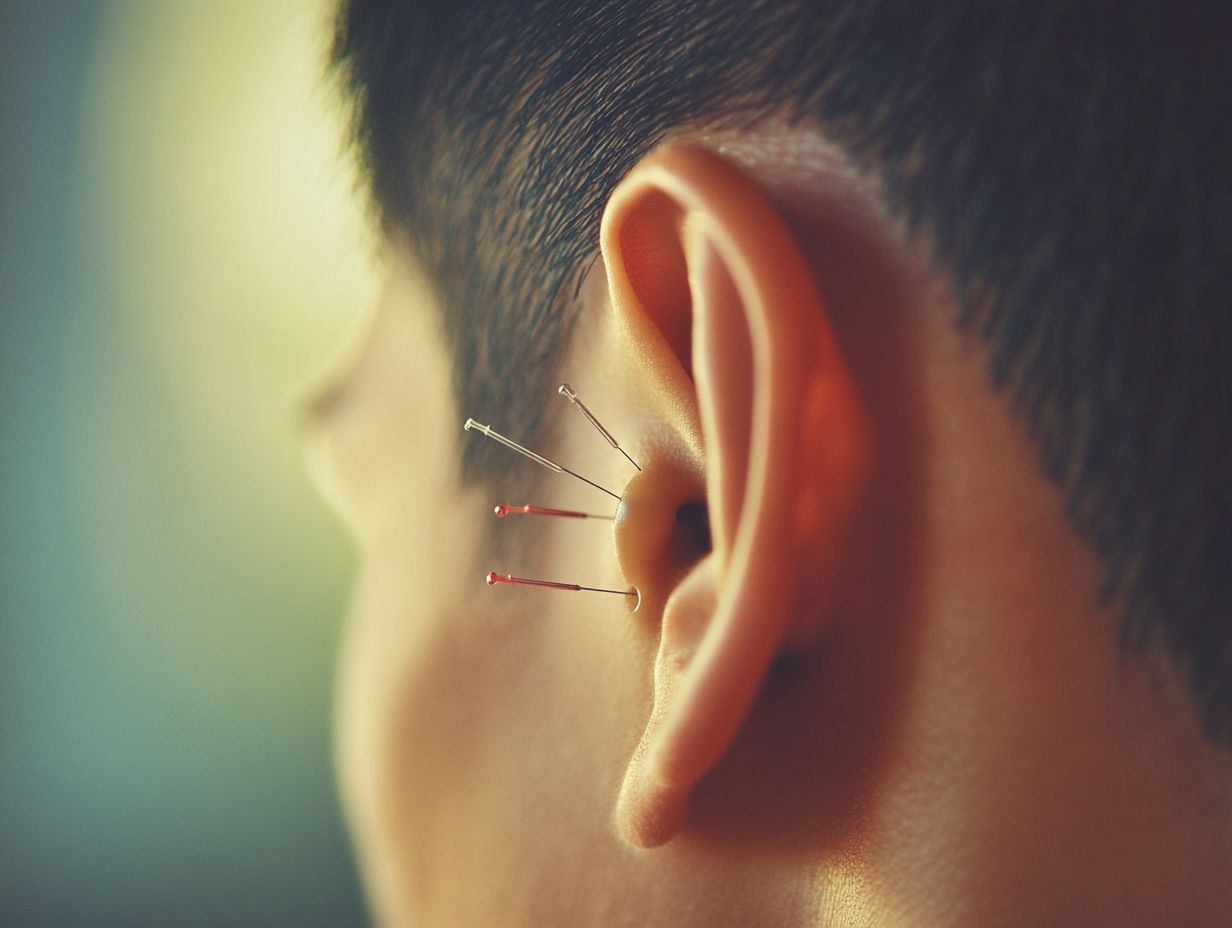
Ear acupuncture, also known as auriculotherapy, is a method that uses specific points on the ear to treat health issues. This technique comes from traditional Chinese medicine, which views the ear as a map of the whole body. According to Britannica, traditional Chinese medicine encompasses a variety of practices, with acupuncture being a fundamental component.
An experienced acupuncturist carries out this treatment to help the body heal and stabilize itself by influencing the energy flow, called chi. By using specific acupuncture techniques, practitioners work to reduce symptoms and improve overall health.
How Does Ear Acupuncture Work?
Ear acupuncture uses thin needles to stimulate specific areas on the ear. This technique can improve energy flow in the body and restore balance.
A certified acupuncturist determines the ear points related to a client’s health issues and uses needle methods to aid the body’s natural healing process.
This treatment focuses on bettering both physical and mental health by tackling issues such as pain and anxiety. Some leading researchers in the field at Frontiers in Neuroscience have explored how acupuncture can mitigate these issues through mechanisms of analgesia.
What Are the Benefits of Ear Acupuncture?
Ear acupuncture provides many health benefits that can greatly improve a person’s life. Some of its benefits include easing pain, handling stress, lowering anxiety, and assisting with addiction treatment, making it a good choice for addressing various health problems.
By focusing on specific points on the ear, people can feel better mentally, relax, and find relief from ongoing pain. Ear acupuncture can also help with managing PTSD and digestive problems, highlighting its broad approach to health. Memorial Sloan Kettering Cancer Center, known for its comprehensive research, suggests that acupuncture is effective for treating various conditions including anxiety and neuropathy ( Source: Memorial Sloan Kettering Cancer Center).
Ear Acupuncture Research Data
Ear Acupuncture Research Data
Pain and Sleep Improvement: Pain and Sleep Scores
Auricular Acupuncture Benefits: Study Highlights
The Ear Acupuncture Research Data gives important information about how well auricular acupuncture works for reducing pain and helping with sleep This data is significant in a healthcare context where chronic pain and insomnia are prevalent, affecting large segments of the population.
Pain and Sleep Improvement assessments reveal measurable improvements in patients receiving auricular acupuncture compared to control groups. On Day 1, the Pain Severity Score is 3.6 for the control group (CG) versus 4.7 for the auricular acupuncture group (AAG). By Day 8, scores remain at 3.6 for CG but drop significantly to 3.1 for AAG, indicating effective pain relief. Similarly, the Pain Interference Score starts at 3.8 for CG and 4.6 for AAG, decreasing to 3.1 and 2.5, respectively, by Day 8, underscoring the treatment’s impact on daily functioning.
The Insomnia Severity Index (ISI) scores further emphasize the benefits of auricular acupuncture. Initially, ISI scores are 18.3 (CG) and 19.2 (AAG), dropping to 15.7 and 13.1 by Day 8. This decrease illustrates notable improvements in sleep quality for individuals receiving treatment.
Auricular Acupuncture Benefits are particularly relevant given the high prevalence of insomnia and chronic pain. 15% of the U.S. population suffers from insomnia, while 74% of veterans and 56% of non-veterans experience chronic pain. Furthermore, 63% of chronic pain patients also struggle with sleep disorders, highlighting the interconnected nature of pain and sleep disturbances.
This data suggests auricular acupuncture as a promising alternative or complementary treatment, particularly for populations like veterans who are disproportionately affected by chronic pain. Auricular acupuncture helps patients by lowering pain levels, reducing disruption, and improving sleep.
The Ear Acupuncture Research Data Auricular acupuncture shows clear benefits in treating chronic pain and insomnia, reflecting wider societal issues related to these conditions. These findings suggest a possible approach for healthcare providers looking for complete, drug-free solutions to these widespread problems.
1. Pain Relief
Ear acupuncture is widely recognized for its effective pain relief capabilities, particularly in managing chronic pain conditions. By stimulating designated acupuncture points, this treatment method can help alleviate discomfort associated with various ailments, including migraines, arthritis, and back pain.
Plus these conditions, it has also shown promise for individuals suffering from fibromyalgia, neuropathy, and even stress-related tension.
This treatment works by stimulating the body’s energy channels, known as meridians, and adjusting pain signals in the nervous system.
As specific points on the ear are stimulated, neurotransmitters and hormones are released, creating a natural analgesic effect that can significantly reduce pain perception.
This method targets the symptoms and underlying reasons, making ear acupuncture a good option for handling chronic pain.
2. Stress and Anxiety Reduction
Ear acupuncture significantly lowers stress and anxiety, which makes it an effective part of relaxation techniques. By targeting specific ear points associated with emotional health, acupuncture can help to lower cortisol levels, the hormone attributed to stress, and promote an overall sense of calm. Clients often report feeling more relaxed and balanced after an acupuncture session, supporting mental health improvement.
These specific spots, like Shen Men and the Relaxation Point, are recognized for their ability to increase calmness and balance.
Shen Men, in particular, is celebrated for its calming properties, offering a peaceful retreat from the chaos of daily life. Many individuals share how their anxiety diminishes after treatment, with some feeling an immediate sense of relief.
Research indicates that regular sessions can greatly improve overall emotional health, motivating those dealing with stress to try this different therapy. This method helps reduce symptoms and also supports better self-awareness and emotional strength.
3. Improved Sleep

One of the main benefits of ear acupuncture is that it can help people sleep better, making it a useful treatment for those who have trouble sleeping. By stimulating acupuncture points related to relaxation and sedative effects, ear acupuncture can promote better sleep patterns and help regulate circadian rhythms. This complete method helps improve mental health and well-being.
By focusing on specific points such as Shen Men, which is known for its calming properties, and the Kidney point, associated with restorative energy, practitioners can tailor sessions to address the root causes of sleep disturbances.
The gentle stimulation involved can alleviate anxiety and stress, common culprits of sleepless nights. Getting enough sleep makes you feel better, strengthens your immune system, and keeps your brain working well. This highlights the link between good sleep and your health.
Using ear acupuncture along with other treatments can greatly help with sleep and daily activities.
4. Addiction Recovery
Ear acupuncture is effectively used in addiction recovery, especially through the NADA method, which focuses on certain ear points to reduce withdrawal symptoms and cravings. This method has been included in substance misuse treatment programs, offering people help during their recovery process. Ear acupuncture can help manage emotions and improve overall well-being.
In recent years, many studies have shown that the NADA protocol is effective in lessening anxiety and agitation while also improving the treatment experience for people dealing with addiction.
Clients often recommend it as a complementary therapy alongside traditional methods, citing its non-invasive nature and quick relief from intense cravings.
Advancements in research are shedding light on the biochemical mechanisms behind ear acupuncture, reinforcing its legitimacy as a viable option in treatment plans.
Adding this practice can help people take a more complete approach to dealing with substance use problems.
5. Enhanced Immune System
Ear acupuncture can strengthen the immune system, making it a helpful treatment for better health. By targeting specific acupuncture points, practitioners can help improve blood flow and strengthen the body’s ability to fight illness. This method is in line with traditional Chinese medicine ideas, focusing on keeping the body in balance for the best health.
Certain points like the Shen Men and the Immune Point are known to trigger the release of endorphins and improve lymphatic flow, resulting in better immune responses.
Therapies like auricular treatment can be customized for personal health needs, strengthening the body’s capacity to fight infections.
Regular sessions help strengthen the immune system and improve health by lowering stress and encouraging relaxation.
The easy access to these ear points makes this treatment a great choice for people looking for preventive care and a healthier lifestyle.
What Are the Techniques Used in Ear Acupuncture?
Ear acupuncture uses different methods to activate points on the ear to help with healing. These methods include:
- Examining the ear to find health issues
- Using acupuncture needles for focused stimulation
- Placing ear seeds for lasting effects
- Improving treatment with electrical stimulation
This approach has significant implications for health and wellness-our elaboration on manual acupuncture techniques demonstrates the practical application of these methods.
1. Auricular Diagnosis
Auricular diagnosis is an important method in ear acupuncture. It helps practitioners identify which acupuncture points to stimulate based on a person’s health problems. This diagnostic approach relies on the principles of traditional Chinese medicine, where the ear is mapped to correspond with various body parts and organs. By pinpointing these areas, practitioners can create specific treatment plans that effectively handle clients’ health issues.
During the process, practitioners typically perform a detailed check by looking at the client’s ear for any signs of soreness or sensitivity, which might suggest areas that require care.
They may also ask about the client’s medical history, current symptoms, and lifestyle factors, combining this information to improve the diagnosis.
This method helps to better understand what the patient needs and matches the treatment plan to their individual body type.
Ear diagnosis is an important step that connects evaluation with effective treatment, contributing to overall health.
2. Ear Seeds
Ear seeds are a popular technique used in ear acupuncture, providing a non-invasive method for clients to continue their acupuncture treatment at home. These small seeds, typically derived from the vaccaria plant, are placed on specific ear points and secured with adhesive tape. This allows clients to apply gentle pressure to the points over time, enhancing the health benefits of their acupuncture sessions.
By integrating ear seeds into their routine, individuals can significantly prolong the effects of their professional treatments. This method lowers stress and anxiety, eases long-term pain, helps with better sleep, and aids in reaching weight loss goals.
Many clients feel more in control of their healing process by actively working on their ear points related to their health problems. Using ear seeds regularly supports the benefits started by acupuncture sessions, providing a complete method to improve health over time.
3. Ear Acupuncture Needles
The use of acupuncture needles is essential to ear acupuncture, as they allow for the exact placement needed for effective treatment. These fine needles are placed on targeted acupuncture points on the ear, promoting energy flow and stimulating the body’s natural healing response. Practitioners work to make the experience comfortable and help clients feel the healing effects of acupuncture therapy.
The selection of needles can vary significantly, with options ranging from very thin, flexible filaments to slightly thicker, solid styles designed for specific conditions. Each needle type has its unique characteristics; for instance, some may be coated for ease of insertion, while others might be designed to remain in place for extended periods.
Experienced professionals use careful methods and specific angles to reduce pain and improve results. Safety is paramount in ear acupuncture, emphasizing the importance of hygiene and the proper disposal of needles.
The skill of the professional is important in deciding how well the treatment will work, helping clients feel comfortable and get the health benefits they want.
4. Electrical Stimulation
Using electrical stimulation in ear acupuncture might increase the effects on acupuncture points, which could lead to better treatment results. Using a gentle electrical current on the needles can improve the treatment, aiding in pain relief, decreasing stress, and offering other health benefits. Many clients choose this method for a stronger acupuncture session.
The use of electrical stimulation in ear acupuncture has gained popularity due to its ability to target specific issues such as anxiety, addiction, and chronic pain more effectively.
Many clients report a noticeable reduction in symptoms after undergoing treatment that combines traditional techniques with electrical stimulation.
Recent advancements in research have highlighted its efficacy, showing that patients experience faster relief and improved overall well-being during and after sessions.
This modern method attracts a wide range of people and highlights the increasing role of technology in overall health practices, connecting old techniques with current wellness options.
What Are the Common Conditions Treated with Ear Acupuncture?
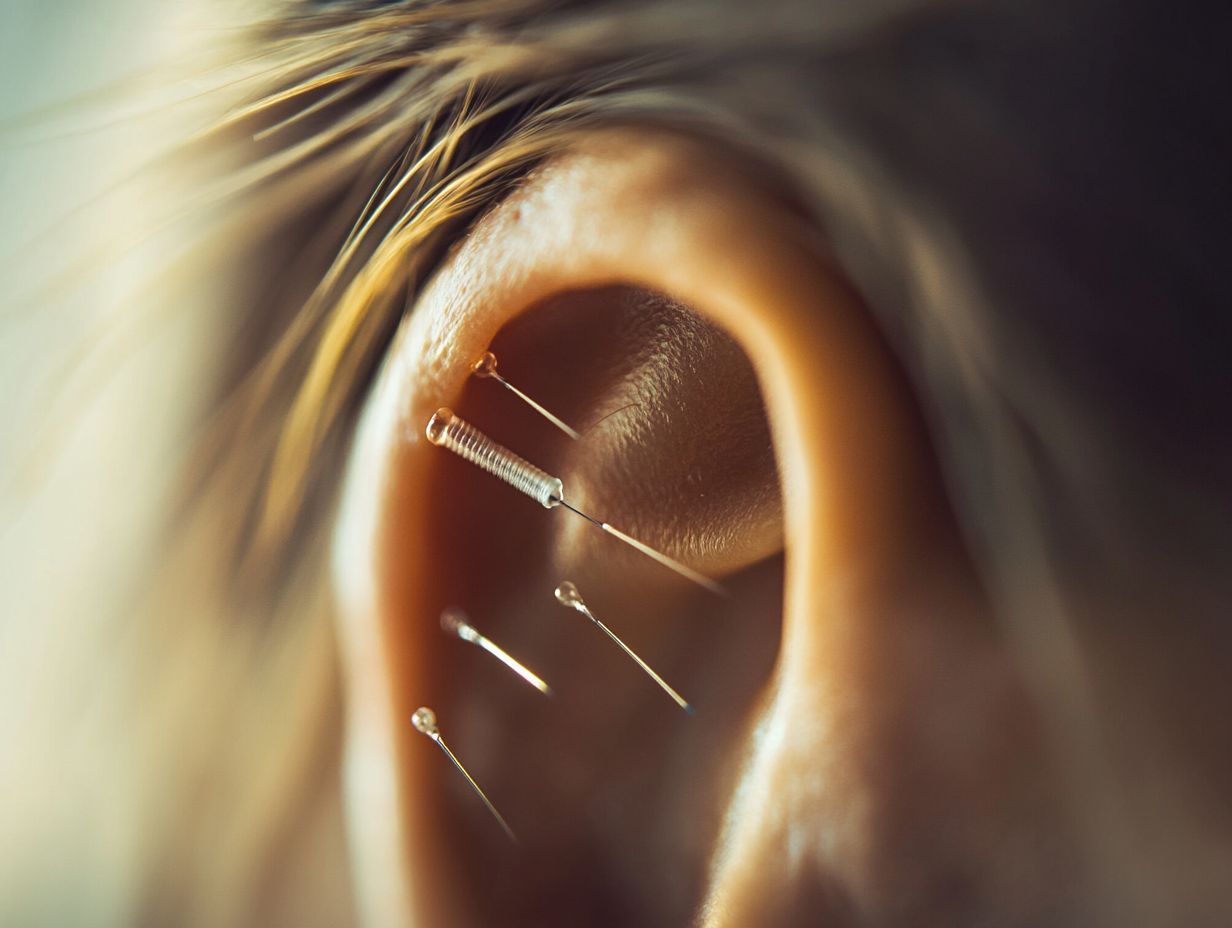
Ear acupuncture is a useful treatment for various common conditions. It can help with chronic pain, insomnia, allergies, digestive issues, and menstrual problems.
By focusing on specific points on the ear, practitioners can create treatment plans suited to the specific health needs of each client.
1. Chronic Pain
Chronic pain management is one of the most significant applications of ear acupuncture, offering relief for individuals suffering from long-term pain conditions. By stimulating specific acupuncture points related to pain perception, clients often experience reduced discomfort and improved quality of life. This method is particularly effective for conditions such as fibromyalgia, arthritis, and migraines.
Practitioners focus on areas of the ear that correspond with various body parts, particularly the Shenmen, which helps calm the mind and alleviate pain, alongside points for specific organs associated with pain pathways.
Clients say they have less pain and feel more relaxed and better after the sessions. Remarkably, studies have shown that regular treatment can lead to lasting benefits, with many individuals experiencing not just temporary relief but a substantial reduction in chronic pain over time.
Testimonials often mention a surprising change in mood and energy as an extra benefit of this method.
2. Insomnia
Insomnia is a common condition that can significantly impact daily life, and ear acupuncture has emerged as a beneficial therapy to promote better sleep. By targeting specific acupuncture points associated with relaxation and sleep regulation, practitioners can help clients achieve a more restful night’s sleep. This gentle approach contributes to improved overall health benefits, reducing stress and anxiety levels.
The treatment typically involves stimulating points such as Shenmen, which calms the mind, and Sleepy Point, known for enhancing deep sleep. Patients often find that their sleep quality improves after just a few sessions, as these targeted interventions help to balance the body’s energy flow.
Including relaxation methods like deep breathing or meditation can greatly improve how well ear acupuncture works. These techniques help with acupuncture benefits and promote a calm state of mind, leading to better sleep.
3. Addiction
Ear acupuncture is important in addiction treatment, especially with the NADA protocol, which targets certain ear points to help people recovering from substance misuse. This focused method helps reduce withdrawal symptoms and cravings, giving clients a helpful therapy choice during their recovery process. Many find significant benefits in their emotional and physical well-being through this method.
The NADA protocol, which stands for the National Acupuncture Detoxification Association, is known for its organized system that supports complete healing.
Practitioners say that using this method helps people relax and builds a sense of togetherness among participants. Positive testimonials highlight how clients often experience improved mental clarity, reduced anxiety, and better sleep patterns after a few sessions.
Research from multiple studies shows that ear acupuncture can effectively lessen cravings and help people find improved methods to cope, playing an important part in tackling addiction.
4. Allergies
Ear acupuncture can lower allergy symptoms, making it a useful treatment option for people facing seasonal allergies and other sensitivities. By stimulating specific acupuncture points, practitioners can help modulate the immune response and reduce symptoms such as nasal congestion and sneezing. This method helps improve health and offers clients a natural option for handling their allergies.
Point selection is very important for the success of this therapy. Key acupuncture points like Shen Men in the triangular fossa and the Allergy point on the outer ear are commonly used to reduce inflammation and improve breathing.
In a full allergy management plan, ear acupuncture helps with symptom relief and supports long-term immunity. Patients frequently report fewer reactions and a better quality of life when combining this method with traditional treatments.
5. Digestive Issues
Ear acupuncture is beneficial for addressing various digestive issues, providing relief from conditions such as irritable bowel syndrome (IBS) and indigestion. By targeting acupuncture points linked to digestive health, practitioners can promote better gut function and alleviate discomfort. This therapy promotes general health and helps the body’s digestion.
Many people have noticed big changes after treatment, such as less bloating, better appetite, and more frequent bowel movements.
Important acupuncture points such as Shen Men and Stomach are often used. Shen Men helps calm the nervous system, while the Stomach point directly affects digestion. Research has shown that stimulating these points can lead to a decrease in digestive discomfort and promote relaxation, creating a more conducive environment for digestion.
Client testimonials further reinforce the positive impact of ear acupuncture on overall well-being, showcasing its potential as a complementary approach to traditional treatments.
6. Menstrual Problems
Ear acupuncture can effectively help alleviate menstrual problems, offering a natural approach to pain relief and symptom management. By stimulating specific acupuncture points related to the reproductive system, clients often report reduced pain, improved mood, and balanced hormones during their menstrual cycle. This method matches the overall approach of traditional Chinese medicine.
Targeting points such as Shen Men, which is known to promote relaxation, and the Uterus point, specifically linked to reproductive health, practitioners focus on restoring the body’s balance and alleviating discomfort.
Clients often notice better well-being, with more energy and fewer mood swings during their period. Many also share positive experiences of fewer cramping episodes and a shorter duration of menstrual symptoms.
Using ear acupuncture as a natural way to manage menstrual issues is becoming more common among health practitioners and clients who have experienced positive results.
Is Ear Acupuncture Safe?
Ear acupuncture is considered a safe practice when performed by a licensed acupuncturist who adheres to proper protocols and hygiene standards. The use of sterile needles and adherence to acupuncture safety guidelines minimizes the risk of adverse effects. The treatment offers reliable results with few side effects, making it a trustworthy option for addressing various health problems.
It’s essential for patients to understand that treatment safety begins with the practitioner’s qualifications and their commitment to using disposable, sterile instruments.
Licensed practitioners have a thorough knowledge of ear anatomy, which helps them find the correct points and prevent issues.
Concerns such as infection or allergic reaction to materials can be adequately addressed through thorough pre-treatment consultations, where practitioners assess medical history and current health conditions.
By keeping things clean and following standard safety rules, practitioners make ear acupuncture more effective and help clients feel safe during their treatment.
How Do I Find a Qualified Ear Acupuncture Practitioner?
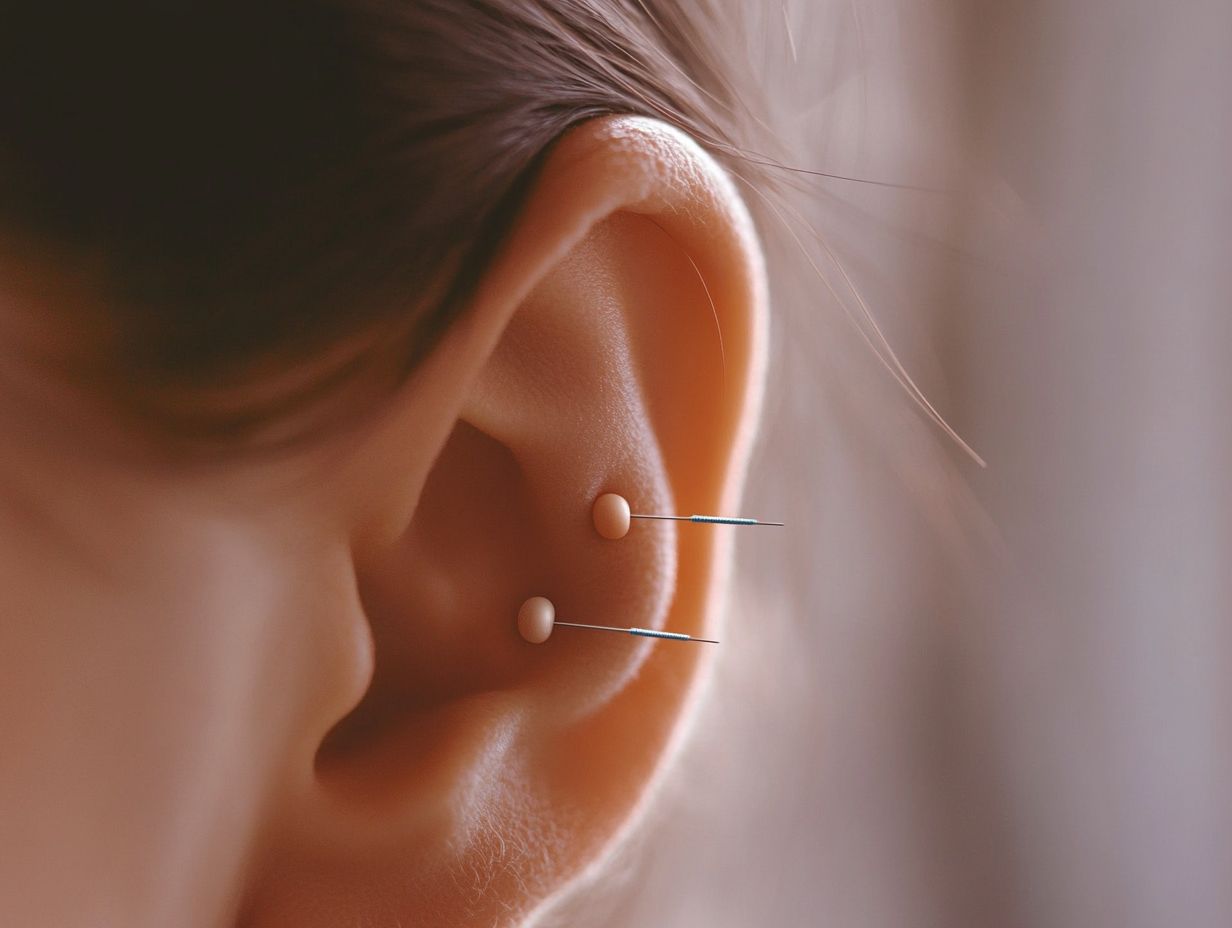
Finding a qualified ear acupuncture practitioner is essential for receiving effective and safe treatment. Look for licensed acupuncturists who are certified by recognized organizations, such as the National Certification Commission for Acupuncture and Oriental Medicine. Client recommendations and reviews can give you a good idea of the practitioner’s abilities and how clients feel about their experience. This helps you pick a capable practitioner for your acupuncture needs.
It’s also important to think about how much experience the practitioner has, as someone with a lot of practice might provide a more complete method suited to personal needs.
Before deciding, look up information in online directories and local health forums. Don’t hesitate to schedule a consultation, as this allows for assessing personal comfort and rapport with the practitioner, a key aspect of therapeutic success.
In the first meeting, asking about how treatments work and what results to expect can help determine if the practitioner matches your health plans, and build trust and confidence in their skills.
What Can I Expect During an Ear Acupuncture Session?
During an ear acupuncture session, clients will experience a calm and welcoming environment. Practitioners carry out a complete check-up to create a treatment plan specifically designed for each person. The acupuncture session typically begins with a discussion of the client’s health concerns and goals, followed by the insertion of needles into specific ear points. Most clients report minimal discomfort during needle insertion, and the overall experience is often relaxing.
This open dialogue allows practitioners to tailor the session to individual needs, ensuring that the treatment aligns with specific health objectives.
Once the needles are carefully placed, clients often find themselves in a meditative state, as the subtle stimulation encourages relaxation and facilitates energy flow within the body.
After the session, practitioners usually give specific advice such as changes in daily habits, mindfulness exercises, or scheduling more sessions to increase the treatment’s effectiveness.
Many clients value the focus on communication. They feel comfortable sharing their concerns and experiences, which builds a strong practitioner-client relationship and improves the therapy’s success.
How Often Should I Receive Ear Acupuncture Treatment?
The frequency of ear acupuncture treatments can vary based on individual health needs and treatment goals. Generally, clients may start with weekly sessions to address acute concerns, gradually transitioning to bi-weekly or monthly visits as their health improves. A treatment plan designed by a certified acupuncturist provides individuals with proper care to improve their health.
The differences in how often treatments are needed depend on the health problems and the person’s goals, like reducing pain, lowering stress, or feeling better overall.
Practitioners often assess each client’s progress regularly, adjusting the treatment schedule as necessary to encompass factors like response to therapy and changes in lifestyle or stress levels.
Looking after your health by yourself can change how frequently you need medical care. For example, someone who regularly practices self-care might not need to visit as often, which can improve health results over time.
Frequently Asked Questions
What is ear acupuncture and what are its benefits?
Ear acupuncture, also known as auricular acupuncture, is a form of acupuncture that focuses on specific points on the ear to promote overall health and well-being. It is believed to stimulate the nervous system and release endorphins, resulting in pain relief, stress reduction, and improved overall health.
What conditions can be treated with ear acupuncture?
Ear acupuncture has been used to treat a variety of conditions such as chronic pain, anxiety, insomnia, digestive issues, and addiction. It can also be used to support weight loss and improve overall energy and mood.
How does ear acupuncture work?
According to traditional Chinese medicine, the ear is a microsystem of the entire body and contains points that correspond to different organs and functions. By stimulating these points, it is believed that energy flow can be balanced and the body’s natural healing processes can be activated.
What are the techniques used in ear acupuncture?
The most commonly used technique in ear acupuncture is the placement of small, sterilized needles on specific points on the ear. Other techniques include acupressure, ear seeds, and electronic stimulation. Every method has specific advantages and can be adjusted to fit personal requirements.
Is ear acupuncture safe?
Ear acupuncture is generally considered safe when performed by a trained and licensed acupuncturist. The needles used are sterile and disposable, reducing the risk of infection. Talk to your doctor about any health issues before beginning treatment.
How many sessions of ear acupuncture are needed for optimal results?
The number of sessions needed for optimal results may vary depending on the individual and the condition being treated. Some people may experience immediate relief after just one session, while others may require multiple sessions. Your acupuncturist will create a treatment plan specifically for your needs and goals.

Sheetal Sharda has a background in CS. She got an interest in Holistic living back in 2018, and has since started exploring more into Naturapathy, Holistic Living, Yoga, and more. She got inspired to start SereneClinics to help people find reliable centers across the world.
